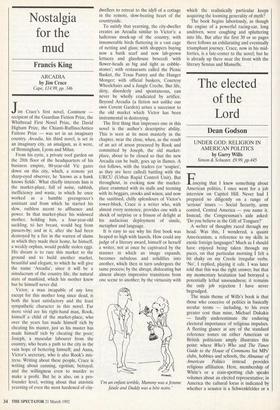Nostalgia for the mud
Francis King
ARCADIA by Jim Crace Cape, £14.99, pp. 346 Jim Crace's first novel, Continent recipient of the Guardian Fiction Prize, the Whitbread First Novel Prize, the David Higham Prize, the Chianti-Ruffino/Antico Fattore Prize — was set in an imaginary country. Arcadia, his third novel, is set in an imaginary city, an amalgam, as it were, of Birmingham, Lyons and Milan.
From his eyrie, a private roof garden on the 28th floor of the headquarters of his business empire, 80-year-old Vic gazes down on this city, which, a remote yet sharp-eyed observer, he 'knows as a hawk knows fields'. What chiefly interests him is the market-place, full of noise, rubbish, inefficiency and waste, in which he once worked as a humble greengrocer's assistant and from which he started his slow, ruthless ascent to affluence and power. In that market-place his widowed mother, holding him, a four-year-old suckling, to her breast, would beg from passers-by; and in it, after she had been destroyed by a fire in the warren of slums in which they made their home, he himself, a weakly orphan, would peddle stolen eggs. His dream is to raze this market to the ground and to build another market, beautiful and elegant, to which he will give the name 'Arcadia', since it will be a simulacrum of the country life, the natural state of mankind, which his mother knew but he himself never did.
Victor, a man incapable of any love except for this mother long since dead, is both the least satisfactory and the least sympathetic character in this novel. Far more vivid are his right-hand man, Rook, himself a child of the market-place, who over the years has made himself rich by cheating his master, just as his master has made himself rich by cheating the poor; Joseph, a muscular labourer from the country, who beats a path to the city in the vain hope of bettering himself; and Anna, Victor's secretary, who is also Rook's mis- tress. Writing about these people, Crace is writing about cunning, egotism, betrayal, and the willingness even to murder to make a profit. But he is also, on a pro- founder level, writing about that atavistic yearning of even the most hardened of city-
dwellers to retreat to the idyll of a cottage in the remote, slow-beating heart of the countryside.
To satisfy that yearning, the city-dweller creates an Arcadia similar to Victor's: a ludicrous mock-up of the country, with innumerable birds fluttering in a vast cage of netting and glass; with shoppers buying now a batik scarf and now lab-grown lettuces and glasshouse broccoli 'with flower-heads as big and tight as cobble- stones'; with restaurants called the Picnic Basket, the Texas Pantry and the Hunger Monger; with official buskers, Courtesy Wheelchairs and a Jungle Creche. But life, dirty, disorderly and spontaneous, can never be wholly eradicated by artifice. Beyond Arcadia (a fiction not unlike our own Covent Garden) arises a successor to the old market which Victor has been instrumental in destroying.
The first thing that impresses one in this novel is the author's descriptive ability. This is seen at its most masterly in the chapter, near the close, when, as the result of an act of arson procured by Rook and committed by Joseph, the old market- place, about to be closed so that the new Arcadia can be built, goes up in flames. A riot follows, with the traders (or `soapies', as they are here called) battling with the URCU (Urban Rapid Control Unit). But throughout, in evoking now the market- place crammed with its stalls and teeming with its beggars, crooks and winos, and now the sanitised, chilly splendours of Victor's tower-block, Crace is a writer who, with almost every sentence, provides one with a shock of surprise or a frisson of delight at his audacious deployment of simile, metaphor and language.
It is easy to see why his first book was heaped so high with laurels. How could any judge of a literary award, himself or herself a writer, not at once be captivated by the manner in which an image expands, becomes nebulous and solidifies into another, which then in turn undergoes the same process; by the abrupt, dislocating but almost always impressive transitions from one scene to another; by the virtuosity with 'I'm an enfant terrible, Mummy was a femme fatale and Daddy was a bete noire.' which the realistically particular keeps acquiring the looming generality of myth?
The book begins laboribusly, as though the engine of a powerful racing-car, long undriven, were coughing and spluttering into life. But after the first 30 or so pages there follows an exhilarating and eventually triumphant journey. Crace, now in his mid- forties, is a late-corner to the novel; but he is already up there near the front with the literary Sennas and Mansells.


























































 Previous page
Previous page